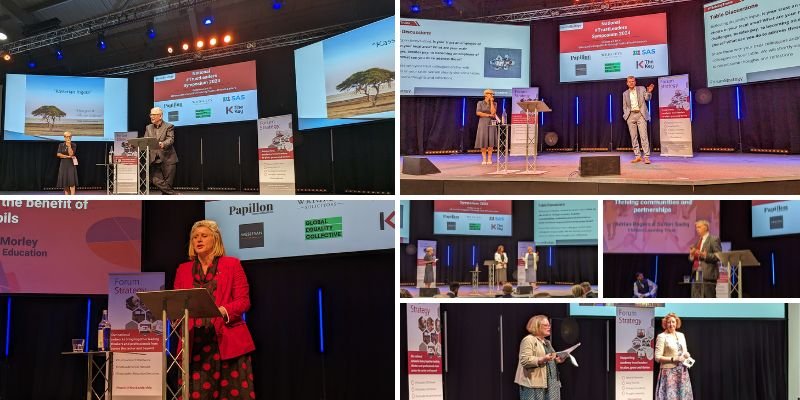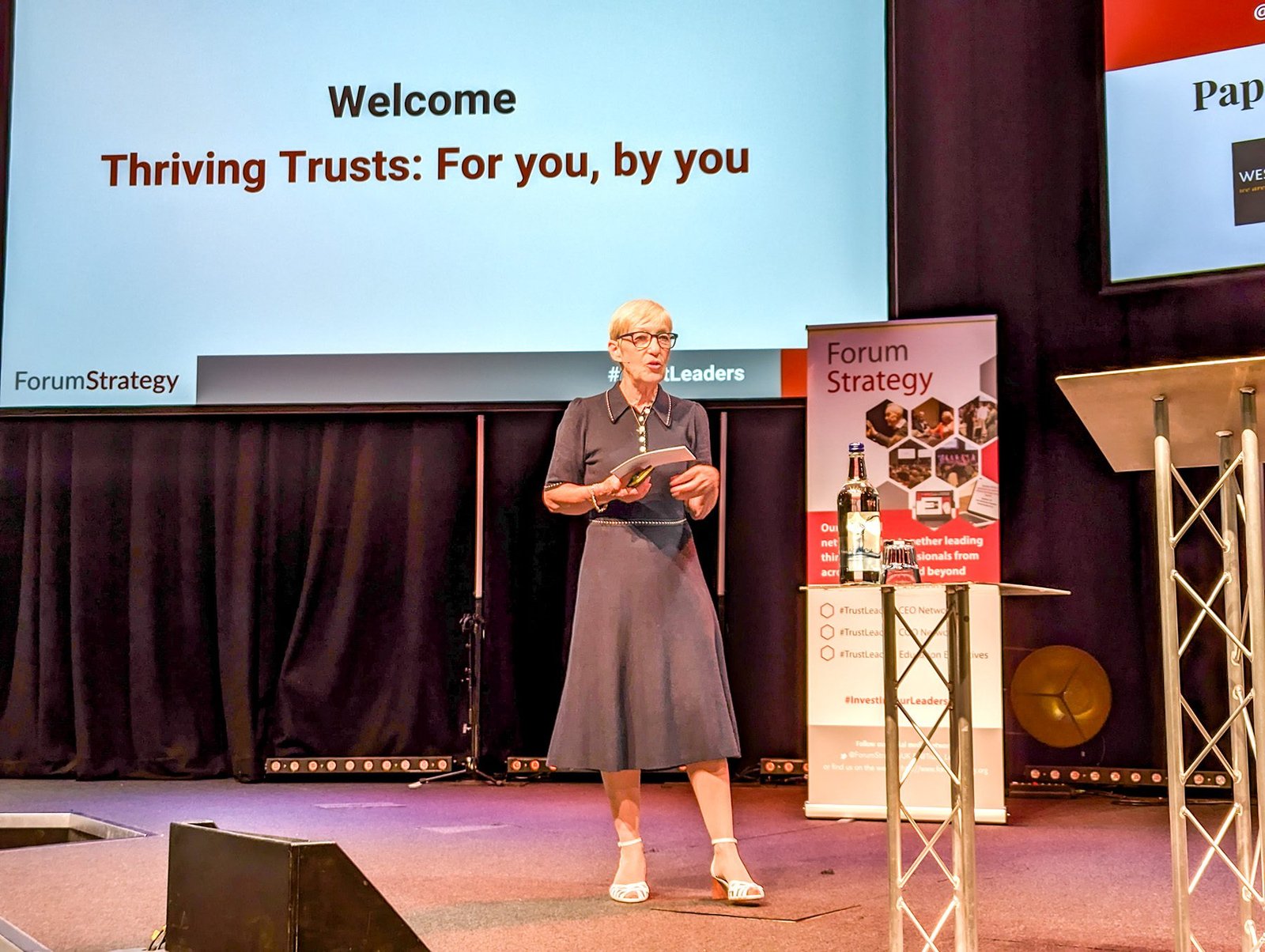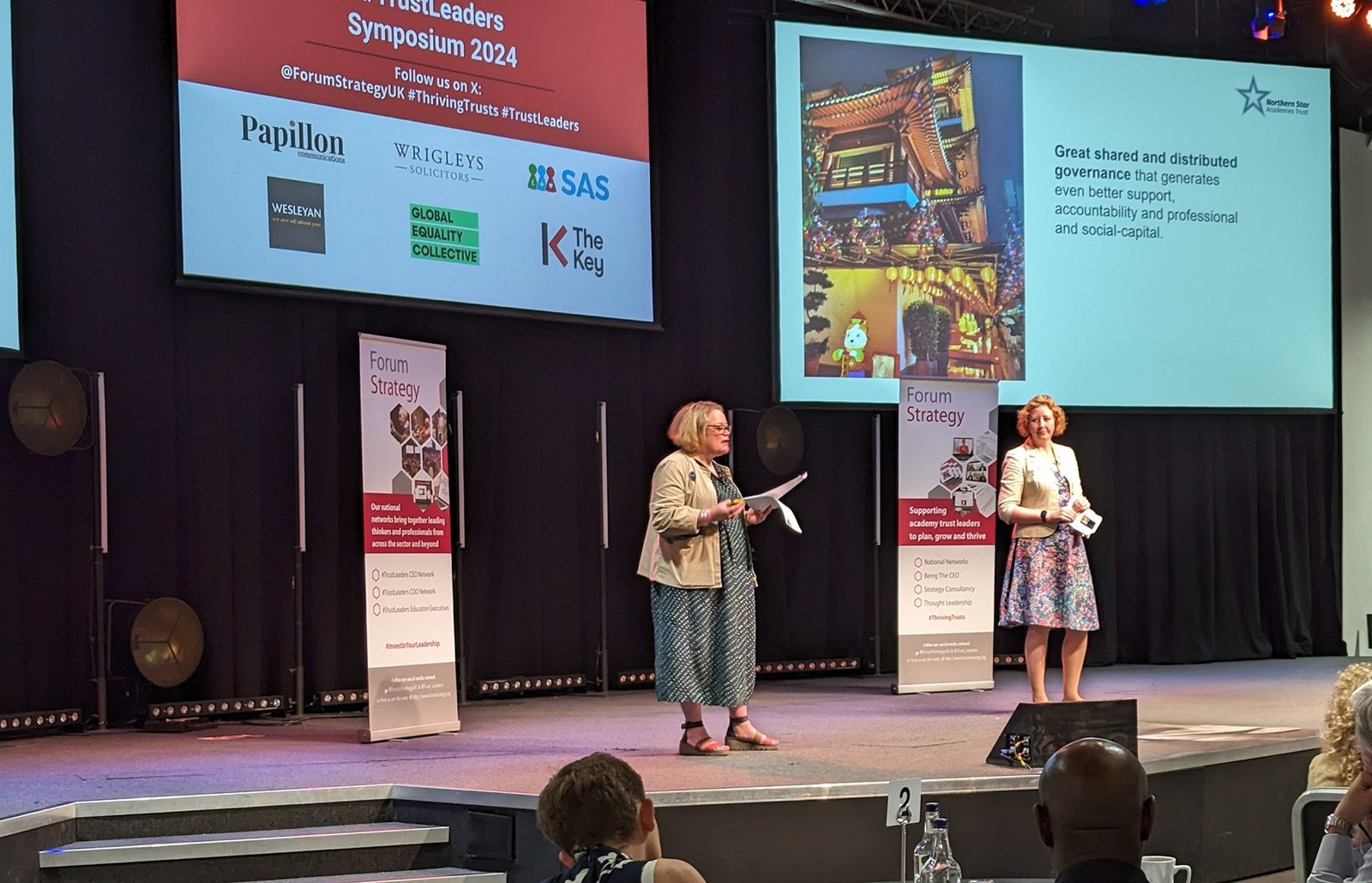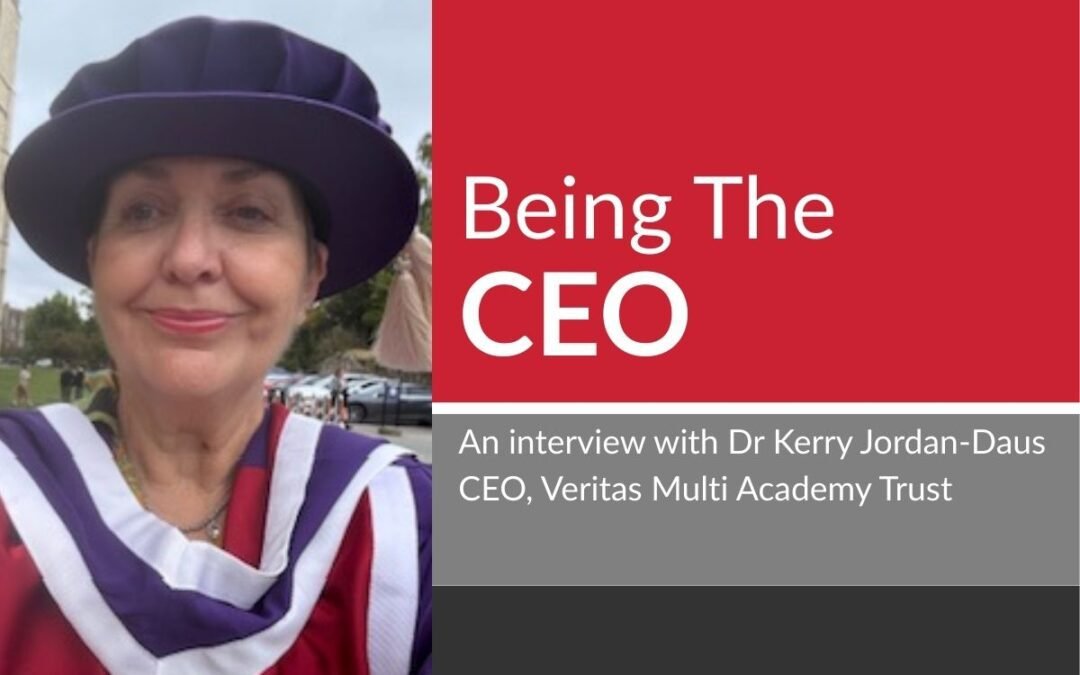
Introduction to Thriving Trusts
On 12 June 2024 we were delighted to welcome colleagues from across the country to the third annual National #TrustLeaders Symposium held at Trent Vineyard in Nottingham; bringing together individual members of Forum Strategy’s National CEO, COO and Education Executive Networks.
The event was titled Thriving Trusts: For you, by you, and was led principally by members of Forum’s #TrustLeaders networks and was once again supported by Sir Steve Lancashire and facilitated by Jane Creasy, a highly experienced educationalist, facilitator, and systems thinker. We were also honoured to welcome Steve Munby – former CEO of the National College for School Leadership and of the Education Development Trust, and author of the acclaimed book ‘Imperfect Leadership – A book for leaders who know they don’t know it all’ – as our keynote speaker this year.
Jane Creasy welcomed colleagues to a day which promised to provide rich, collaborative learning for all; with a range of insights from trust leaders from across the country and time for attendees to reflect and discuss the thinking and ideas presented. The Symposium provided a unique opportunity for members of our three networks to come together to explore the six underpinning principles of Forum’s work on thriving trusts.
Forum Strategy’s CEO, Alice Gregson, then opened the event by reminding us of the work Forum has undertaken over the past 18 months, with both the profession and experts, to define ‘thriving trusts’. Alice explained that when we use the term thriving trusts, we are envisaging organisations where all who learn with them, work within them, and come into contact with them, feel inspired, feel they belong and feel supported.
“Thriving trusts are intentional in setting this ambition and are relentless in achieving it.”
Forum Strategy introduced the concept of thriving trusts in order to provide the education system with a relatable endeavour focused on success for all. Alice described the six principles of thriving trust, as set out in more detail in Forum’s thinkpieces, and emphasised that the Symposium was focused on sharing learning about what it means to thrive, across this incredible national network of trust leaders.
In short, the six principles are:
- Developing and maintaining a collective vision
- Great governance
- School Improvement at Scale
- Being an employer of choice
- Maximising resources for the benefit of pupils and being environmentally sustainable
Being at the heart of our communities
1. Developing and maintaining a collective vision
Colleagues next heard from Steve Munby, who set the context for the day by looking at the first principle of developing and maintaining a collective vision. Steve emphasised that having a collective vision is important for any organisation, but it vital for organisations that are dispersed, such as academy trusts, because it brings people together in collective purpose. He described how this enables trusts to be aligned whilst also allowing flexibility for context and agency and individual school level.
Steve drew on his own experience of leading different organisations to emphasise the importance of being invitational in developing a compelling vision that will bring people with you on your organisational journey, and the need to revisit the vision so that it stays relevant and inspiring. He described his approach to developing the vision for the National College for School Leadership (NCSL) upon taking over as CEO in 2005, which saw him commit to ‘phoning 500 headteachers in the first three months of his leadership and inviting their thoughts in his vision. Steve emphasised three important elements of developing a collective vision:
- Be invitational – show that your stakeholders are welcomed and are being listened to.
- Develop a compelling and exciting narrative around your vision.
- Make public promises together and show that you are delivering on those promises.
Steve also described how things can go wrong in developing and delivering on an organisational vision, drawing on his own experience to demonstrate the importance of understanding your context.
Considering the current context for trusts and their schools, Steve reflected on some of the main challenges trusts may have in developing and realising a collective vision, and emphasised the importance of regularly inviting challenge so the vision remains relevant as new staff and schools join the trust. He also commented on the likely changing political landscape and emphasised the importance for trust leaders of maintaining their moral purpose, whilst at the same time managing top-down pressures from new ministers. Steve urged colleagues to “manage upwards” when working with ministers to “intrigue them” with what you are doing across your trusts and schools, so they get a picture of what is working within the system.
Steve stated that as CEOs, trust leaders are the guardian of their organisation’s vision and values and have to model them; and always with a focus on the children and young people they serve – quoting the traditional Masai greeting “Kasserian Ingera”, which translates as:
“How goes it with our children?”
2. Great Governance
Exploring the second principle of thriving governance, we then heard from Jenn Plews OBE, CEO of Northern Star Academies Trust (NSAT) and Helen Murphy, Chair of Trustees at NSAT.
Jenn explained that NSAT is a truly diverse trust, with 65 languages spoken across the trust and serving 2-19-year-olds across its schools. The trust has grown from nine to 15 schools in the last six weeks, but Jenn commented that, whilst the sector has been conditioned to strive for growth, now might be the time to reconsider that strategy.
Jenn and Helen explained how the trust’s strategic priority of environmental sustainability provides the bedrock for all decision-making and enables the trust to effectively monitor its progress. Great shared and distributed governance is at the heart of this second principle of thriving trusts, and Jenn and Helen discussed how NSAT is setting the voice of the child front and centre with its ‘next generation’ board involving children from each school across the trust. Two children from each of the trust’s schools are nominated and these pupils attend board meetings, which all begin with questions from the pupils.
In addition, the trust’s ‘green futures’ board of teachers and leaders is equipping staff with the knowledge and skills to support pupils to understand climate change; and the trust has been doing some great work on this at primary level with the CAPE (Climate Adapted Pathways for Education) Alliance. The trust has developed a number of civic partnerships based on its core strategic theme of environmental sustainability, and now have a set of “green pillars” and “green non-negotiables” which the trust and its schools must adhere to.
Jenn and Helen reflected on some of the issues they are grappling with as a trust, including diversity (of people and of thought) and representation; finance and funding (how best to use its resources to invest in the school estate for the benefit of pupils); new schools joining the trust; and ensuring that the challenges faced by the communities it serves are recognised and supported.
Helen described how, being new to the post of Chair (having previously been Vice-Chair) and coming from a business background, she has been learning more about the education and trust sector by connecting with other Chairs. Jenn highlighted the importance of CEOs being flexible and adaptable and how the support of other colleagues has been invaluable.
Closing their presentation, Jenn and Helen called on more trusts to work with them on developing a focus on environmental sustainability.
3. School Improvement at Scale
Next, we heard from Wayne Norrie, CEO at Greenwood Academies Trust (GAT) and Annette Montague and Sarah Mills, Chief Education Officers at GAT, about how they are approaching the third principle of thriving trusts to enable school improvement at scale. Wayne explained how their ‘We are GAT’ document describes the trust on one page and underpins everything it does and the work the trust does on culture for both staff and pupils – with a focus on “servant leadership”.
Annette and Sarah explained how the trust has built its capacity for school improvement, with a focus on people and their professional development at its core. They described how the GAT education directors design and deliver the trust’s CPD offer, which gives the content credibility and means the offer is trusted by staff. It also means that the trust can be “relentlessly agile” with its CPD offer, responding quickly to any recognised gaps or needs as they arise.
Annette and Sarah described the function of their different Primary Assurance Boards, which all have sitting on them a leader from each of the GAT primary academies, to ensure there is an expert in every academy who can develop the trust’s expectations and ways of working in that academy. The Learning Assurance Board has developed the trust’s nine principles of high-quality, inclusive primary teaching; and the trust’s primary CPD is now based on these.
The trust also needed a strategy to bring its secondary schools together; and the development of its Secondary Improvement Framework sets out a core entitlement and enhanced entitlement, which have created consistency and a clear sense of direction, as well as enabling contextual autonomy for the trust’s secondary schools. This essentially forms a contract with GAT’s secondary principals and clarifies what the trust will provide for them. A key part of this framework has been a focus on risk management, with discussions taking place three times a year with the principals and helping to inform their strategic planning. Sarah and Annette described how the Academy Improvement Plans are at the centre of the shared trust strategy, with schools seeing the support they get from the trust as a core element of their daily improvement strategy. They emphasised that working as a collective and being agile in their approach is reaping rewards but the real challenge for the trust is how to achieve a fully scaled improvement strategy whilst maintaining a relentless focus on the improvement of individual academies.
4. Being an Employer of Choice
Colleagues then heard from Jonny Uttley, CEO at The Education Alliance (TEAL) about the work the trust is doing on the fourth principle of thriving trusts in being an employer of choice. Jonny explained that, on joining TEAL as a second-generation CEO in 2018, he undertook a big piece of work with staff across the trust based on ‘starting with why’ from the work by Simon Sinek. This began with the overarching question of why they and the trust want their pupils to do well, which to the development of TEAL’s core purpose, underpinned by Jonny’s belief that it is possible to create and organisation where both pupils and staff do well. Jonny explained that the trust’s School Improvement Strategy is based on doing a small number of things really well in order to achieve its core purpose.
Jonny explained his belief that the single most important thing we can do for pupils in our schools is to give them a great teacher, and that it is possible to achieve this aim in a way that ensures pupils and staff are both thriving. He described the evidence around the retention crisis in schools, which shows that not only are we losing teachers, we are losing them in the greatest numbers at the point where the evidence also shows they are becoming the most effective (two years into their teaching career).
Jonny emphasised that the main driver of the retention crisis is the teachers’ workload is unmanageable, so we need as a system to change the lived experience of teachers. We also know that knowing their work is appreciated by leaders is really important to teachers, which is why creating a culture of support and trust is also vital. Jonny explained that TEAL has developed a ‘Workload Charter’, which states at the top that the trust does not want people to have to chose between being a good employee and being a good parent, son, daughter, friend, etc; and that starts from the premise that teachers are effective professionals. The trust has also developed an ‘Ethical Leadership Charter’ which underpins the competencies and behaviours expected of all leaders across the trust.
Jonny described some of the things that have worked well at TEAL, including decoupling pay and performance, stripping back the amount of data that needs to be collected, and “getting rid of a load of the stupid stuff”! He explained some of the things the trust has introduced which have helped support staff health and wellbeing, including improved special leave, a women’s health policy, a menopause policy, annual discussions with individual staff about their working patterns, and paying for staff prescriptions.
Whilst Jonny admits things at the trust are still far from perfect, he is proud that their efforts to date mean that staff survey data shows they are doing significantly better than the national average in terms of workload and staff support. However, they are still grappling the 18% of TEAL staff who still feel their workload is unmanageable and how to achieve the public promise it makes in its workload charter that staff should not have to make a choice between being a good employer and their other life commitments.
Jonny closed by describing how he is learning from what others do in their leadership, in particular drawing on the work undertaken by James Timpson and his new book ‘The Happy Index’. James explains in the book how he looks at one metric each week to measure how successful his organisation (Timpson’s) is, and that measure is staff happiness. Jonny suggests that staff happiness is the ultimate measure of being an ‘employer of choice’.
5. Maximising Funds & Resources for the Benefit of Pupils and Communities
We next heard from Katrina Morley, CEO of Tees Valley Education, who discussed the work they are doing on the fifth principle of thriving trusts, to maximise funds and resources for the benefit of pupils and communities.
Katrina described how all the trust’s best value decisions are led by knowing the demographics of the communities they serve and that a focus on long-term investment and impact has improved the trust’s capacity to offer more opportunities for both pupils and staff. This long-term approach holds the trust accountable to its staff, pupils and communities and ensures that it is investing ethically. Katrina emphasised that they do not wait for permission to do things, rather they invest in their children and staff because healthy people matter. Thinking always in terms of policy, place and people, Katrina described that the trust does things because they are the right thing to do, even if they seem difficult at the time, and always with the future in mind. The trust has sought from the outset to maximise resources for all, including to support inclusion and SEND provision – this has included investment in capital infrastructure which has also been an investment in capacity identified as a local need.
Katrina explained some of the many benefits of taking this long-term approach, including that a lifelong investment also means a lifelong return, there has been a positive impact on teacher and wider staff retention, talent it attracted if they can see the trust invests in their development, and staff have had the opportunity to contribute to research projects and grow their expertise as a result.
Katrina also described how “thinking like an artist but planning like an engineer” has enabled greater creativity within the trust for maximising its funds and resources, as well as ensuring a focus on creativity for pupils, which is one of its trust values. Katrina has looked for opportunities to sit on a range of organisational boards, which has increased her local and regional connections, improved her own leadership skills, and provided greater funding opportunities.
Considering some of the ways funding has been raised and used to best value across the trust, Katrina emphasised the importance of seeking out opportunities for connection, including system leadership opportunities; as well as providing release time for staff to undertake local voluntary opportunities, and contributing to research and articles, which spreads the word more widely about your trust’s work.
Katrina also emphasised how capacity and expertise are the bedrocks of best value and set out some of the ways the trust is investing in developing this amongst its staff. She described the trust’s focus on strategic workforce development and strategic talent mapping, and the importance of context when undertaking this work. Katrina explained how the use of grants and bursaries enables staff to participate in research projects and the expectation placed on every assistant headteacher that they will contribute their expertise when needed.
Closing her input, Katrina discussed with colleagues how they could best leave a positive legacy for their trusts, schools, staff, pupils, and communities, including the importance working with organisations such as Forum Strategy, and learning from other trusts, organisations, and parents to better determine what is needed. Katrina said that whilst there have been difficult decisions to make about the use of funding and resources, they are always focused on best value; and whilst budgeting is done annually, the return on investments can last for generations.
6. Academy trusts at the heart of their communities
Finally, we explored the sixth principle of thriving trusts – thriving communities and partnerships – with Adrian Rogers, CEO of Chiltern Learning Trust (CLT) and Sufian Sadiq, Director of Teaching School at CLT.
Adrian invited colleagues to visit the trust to see in person the things they are doing in this space. He explained that, for him, community is about getting the best outcomes for children and young people. Adrian commented emphasised that CLT is fully integrated in its communities, and how this was demonstrated during the COVID pandemic as school leaders became the bedrock of their communities. He suggested that the Ofsted Parent View measure of whether a child is happy at the school and if you would recommend it was a good measure of the value placed by the community on your school and trust. Adrian explained that CLT’s School Improvement Framework also includes a measure on community engagement.
Sufian explained that community to the trust is about closeness to the vastly different communities it serves. He emphasised how it is vital that teachers and leaders across the trust understand the lived experiences of the children and families in their communities. Sufian gave examples of the many vital partnerships the trust has formed with local organisations, including charity groups, and sports groups. Sufian himself sits on 14 charity boards and both Adrian and Sufian are on the board of Luton Town FC. These actions have meant that the trust has been able to get more resources back into the communities that need them.
Sufian also explained how the trust tends to recruit staff from its local communities and that staff attend as many local events as possible to better engage with and understand their communities. This means that both staff and leaders across all the trust’s schools now better represent its many different communities and their pupils.
Adrian closed by describing some of the challenges still faced by the trust, including the impact of world events on its different communities, and ensuring the leadership across the whole trust fully reflects the trust’s values.
In conclusion: A summary of the day
Sir Steve Lancashire closed the day by summarising the following key learning points from each input and asked colleagues attending the event to commit to some key actions based on their learning from the day:
Vision (Steve Munby)
- Make your vision ‘invitational’ and accessible to all to secure commitment.
- Intrigue the top because we know better than they do!
- Commitment – invite you to make your public promises.
Governance (Jenn Plews and Helen Murphy)
- The special relationship between governance and executive leadership.
- Recognition that you need a diversity of viewpoints.
- Governance is living and fluid/adaptable.
- Clarity around the strategic priority of environmental sustainability.
- Commitment – how are you meaningfully engaging young people in governance?
School improvement at scale (Wayne Norrie, Sarah Mills and Annette Montague)
- Codify improvement at scale in your own trust.
- Reflect the synergy between school improvement and CPD.
- Recognise that one size doesn’t fit all.
- Commitment – be professionally generous and share your trust model of improvement at scale.
Employer of choice (Jonny Uttley)
- Consider this a broad statement of public service.
- Start with ‘why’.
- Think about retention as well as recruitment and the lived experience of teachers.
- Be creative about how you invest in wellbeing.
- Commitment – have a go at identifying three things that might improve the lived experience of teachers and other staff across your own trust.
Maximising funds and resources (Katrina Morley)
- Think more broadly about resources – it’s not just about money.
- Investing in people means investing in the future.
- Think in terms of your 100-year legacy.
- Commitment – articulate your 100-year legacy for your own trust.
Communities and partnerships (Adrain Rogers and Sufian Sadiq)
- Integration and involvement in communities impacts positively on outcomes.
- Measure what you value.
- Understand your communities and the lived experiences of pupils within them.
- Commitment – Forge a partnership that will centre you more fully in your communities.
Steve thanked everyone for their huge professional generosity throughout the course of the day, especially the contributors, and for enabling a fantastic day of learning for all. A copy of Sir Steve’s blog reflecting on the day indepth, with a number of ‘calls to action’ can be accessed on the Forum Strategy website.
We would like to thank everyone who was able to join us on the day for taking the time to work together in our collective pursuit of developing thriving trusts for a thriving education system.
National #TrustLeaders Symposium 2024
you can access the all the resources from the day by visiting the National #TrustLeaders Symposium 2024 page, including Sir Steve’s blog, the highlights video and interviews with our contributors.










